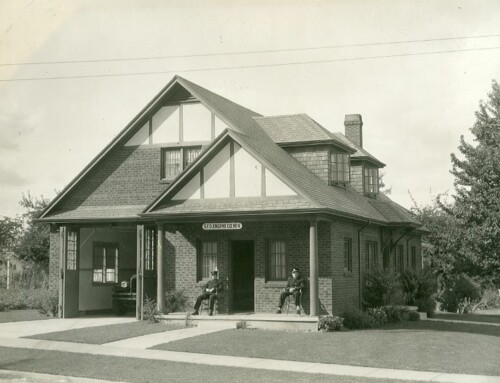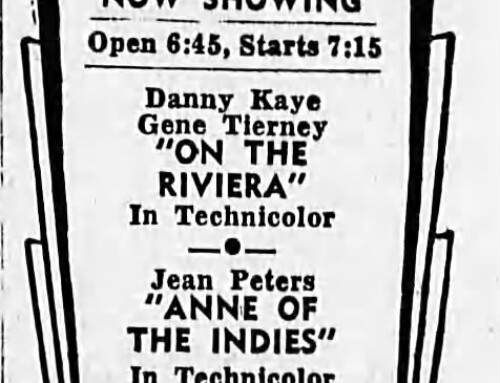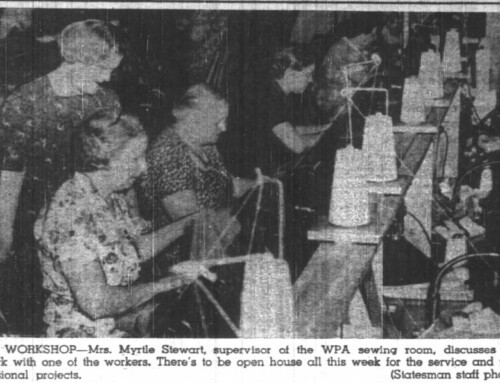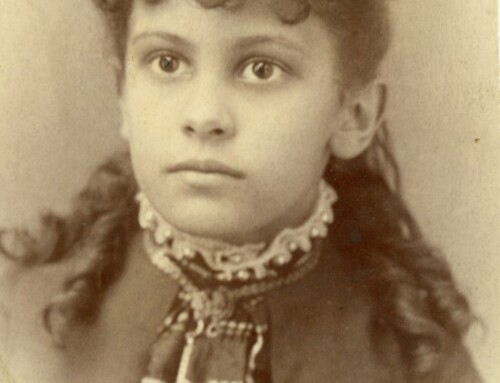This article appeared in the Statesman Journal newspaper June 1, 2014. It is reproduced here with citations for reference purposes.
The First Wednesday celebration in June will be celebrating the history of German-speaking Salem residents. German, Swiss and Austrian immigrants to Salem brought with them their language and their culture.
The Salem German Society met monthly in Salem during the years leading up to the outbreak of WWI.[1] Their programs included speakers, music and readings in German. They were one chapter of many organizations statewide which sought to promote the German language and culture in Oregon. They also organized many community celebrations to commemorate events important to the German-speaking population. There were parades and pageants to celebrate German Day, “the landing of the first Germans on American soil, in Pennsylvania, October 6, 1683.” They even ordered two special train cars to bring folks from Portland and beyond to celebrate the 100th anniversary of “Tyrolese Independence” – or the 1809 defeat of Napoleon-loyal French and their allied Bavarian troops in the region of Tyrol, now in Austria. Austrian-born, Salem resident Joseph Albrecht was given a place of honor at this celebration, being the “oldest Tyrolese present, three of his mother’s brothers having fought under Andreas, the immortal.”[2]
Longtime Salem educator Mary Eyre gives a tantalizing tidbit of information about an enclave of German-speaking Salem residents she says was referred to as “Dutchtown.” As she explained:
“The far corner, 25th Street, south of the railroad tracks…was known as Dutchtown. Some German families lived there and Americans have had a way of substituting Dutch for German. Family names were Bach, Tasto, Shedeck (fireman), Zwicker (long associated with carpets, the Zwicker Fluff Rug was a way of recycling old carpets).”[3]
We also recently uncovered journals and scrapbooks (2006.047.0035) from Jacob Muellhaupt, who was a pastor of the German Reform Lutheran Church in Salem. Muellhaupt was born in Switzerland 1846. Through the generous help of Irmgard Forsythe, we have been able to translate a few pages that talk about the pastor’s impression of the Oregon he found when he arrived in the 1870s. In his own words as he wrote to a German language newspaper back east from his outpost at Tualatin: “Here at the Willamette River we cannot speak of a freezing winter with ice and snow. Nature here only goes into a gentle slumber for about 3 months every year… During the last 3 winters we have only seen snow and ice more than 50 miles away, where Mt. Hood, Mt. Adams and Mt. St. Helens lift their snow covered peaks toward heaven. But in the area of spiritual life, there is great concern. Never before have we lived among people like here, with so many non-believers, free-thinkers, church-haters and brazen, insolent, philosophical lecturers. Also never before, like here have we seen so many broken marriages, dens of vice, suicides, mental illness and so many people where it is obviously not the unhealthy air, hard work, hunger, etc. but rather self-indulgence and an unhealthy life style that contribute to their damage health, destroyed life and early death.”
According to these newly translated articles, in addition to his work in Tualatin, Muellhaupt was also involved in the establishment of the German Lutheran Reformed Congregation Bethanien in Salem, which started out with a congregation of 20 people. The church would continue to grow. By 1883, it had a building located on Capital Street on the southwest corner of Marion Street. Not to be confused with the German Lutheran Church, German Methodist Episcopal Church or the First German Baptist Church also located in town, the German Reformed church grew under Rev. Muellhaupt’s care to two weekly Sunday services and weekly Wednesday Bible classes by 1905. Muellhaupt died in 1907, but many family members remained in the Salem area.
If you are interested in learning more about Salem’s German history, check out the walking tour that will be held downtown, Wednesday June 4th. The tour starts at 6:00 pm. More information is available at Salemdowntown.net.
[1] “German Society of Salem Has Meeting.” Daily Capital Journal. 31 Jan 1910, page 7. [2] “Tyrolese Centennial Celebrated at Salem.” Daily Capital Journal. 30 Aug 1909, page 7. [3] Eyre, Mary. “Some Personal Recollections of Salem Schools: 1904-1982.” Marion County History. Vol XII. Marion County Historical Society, 1982.








Leave A Comment